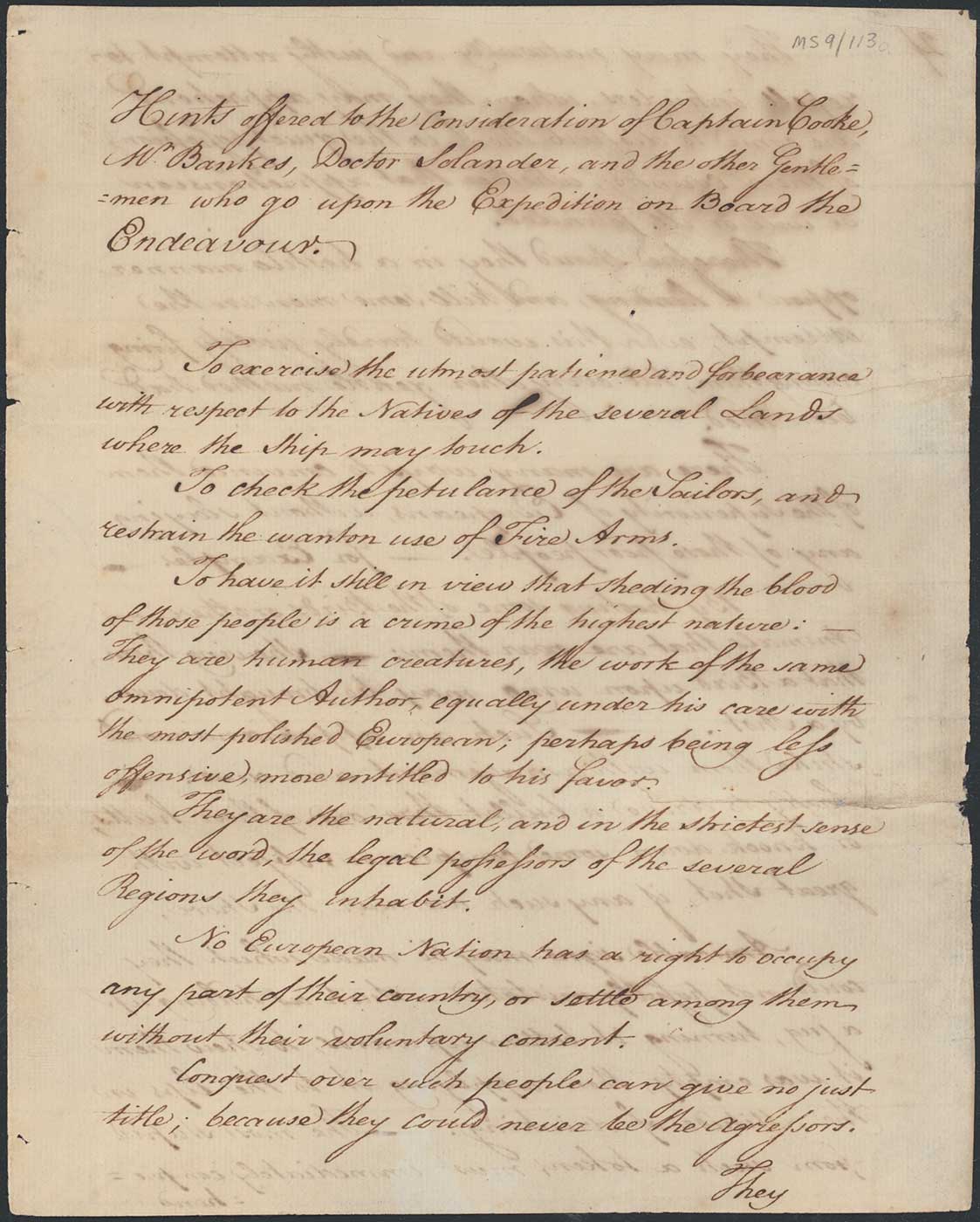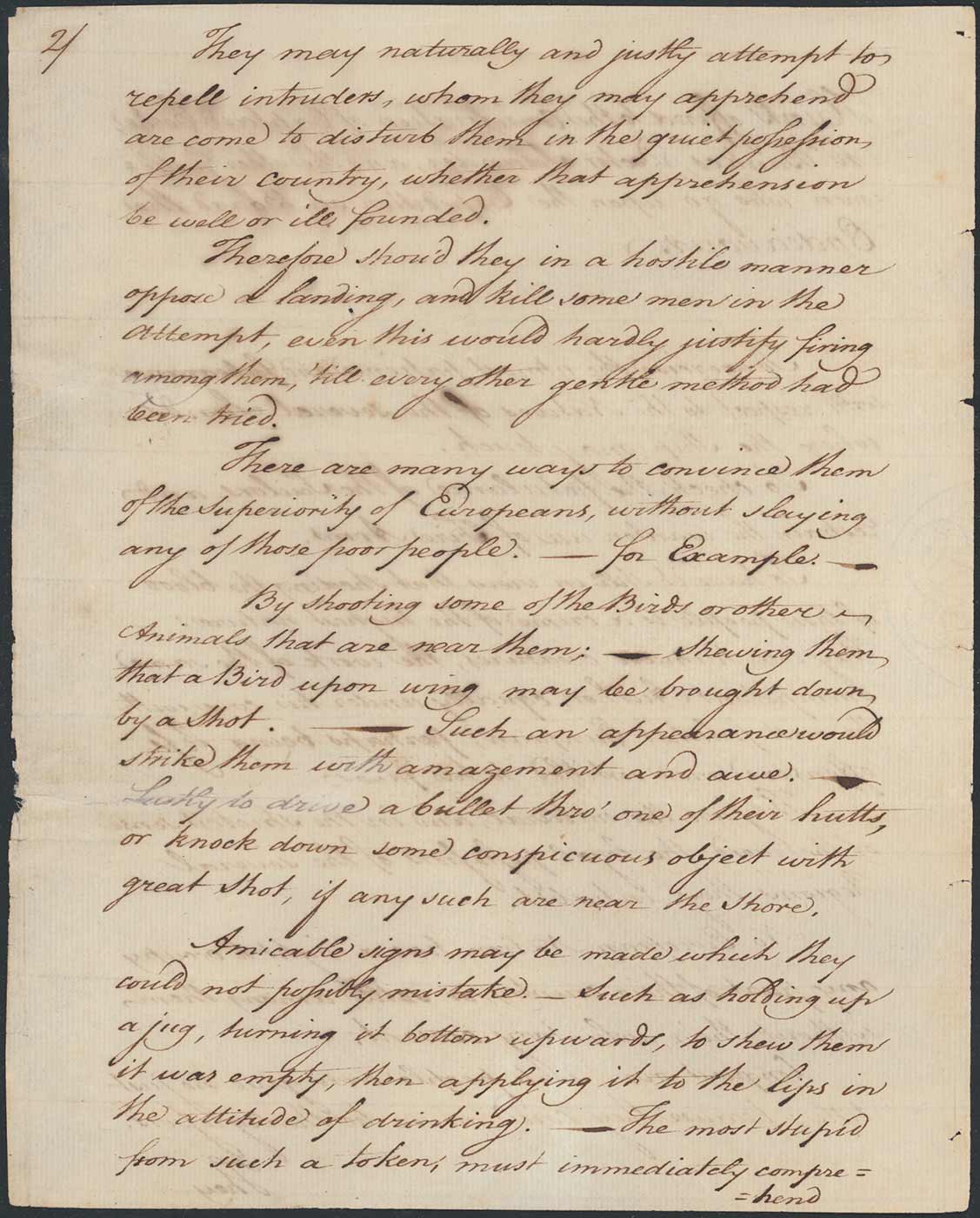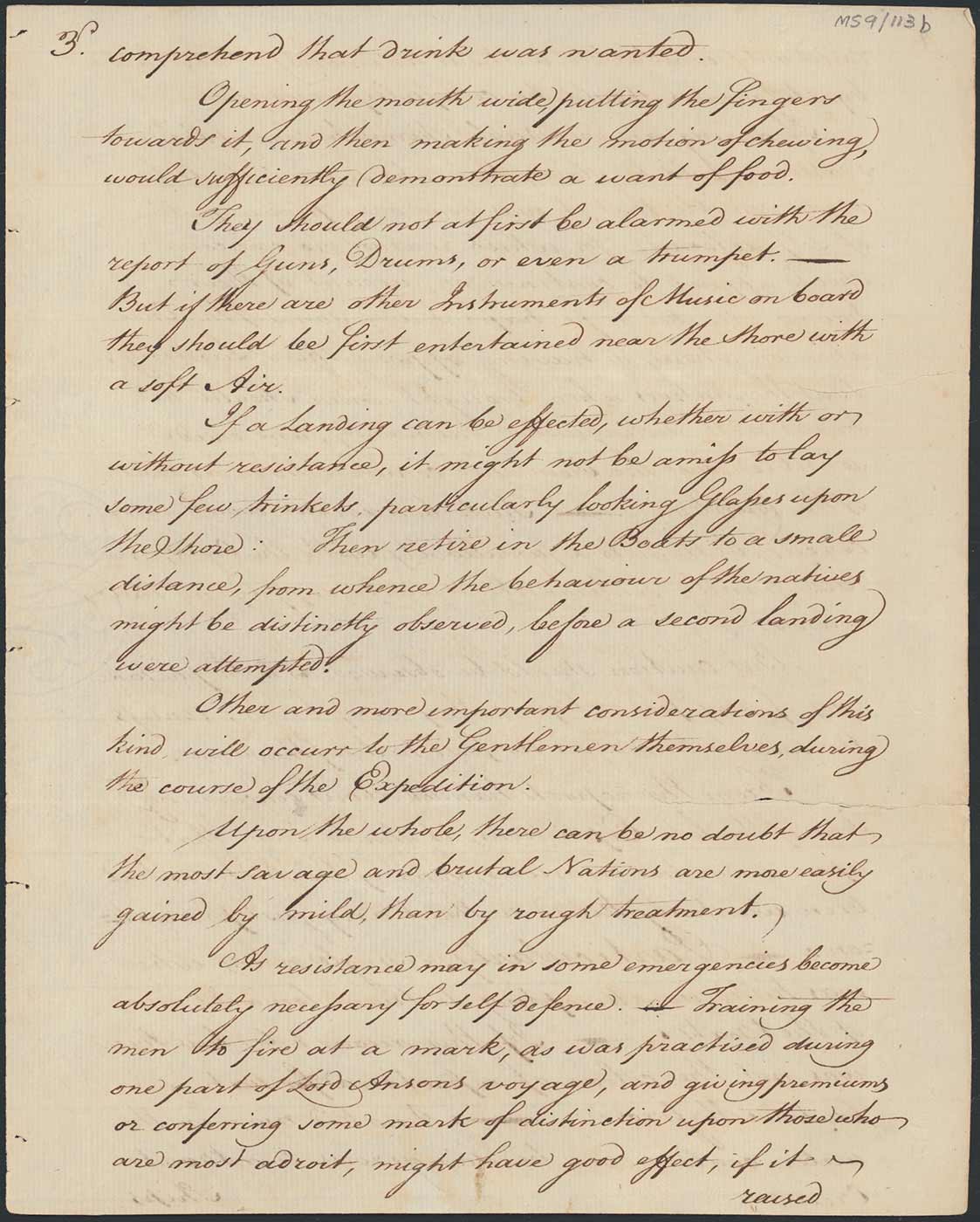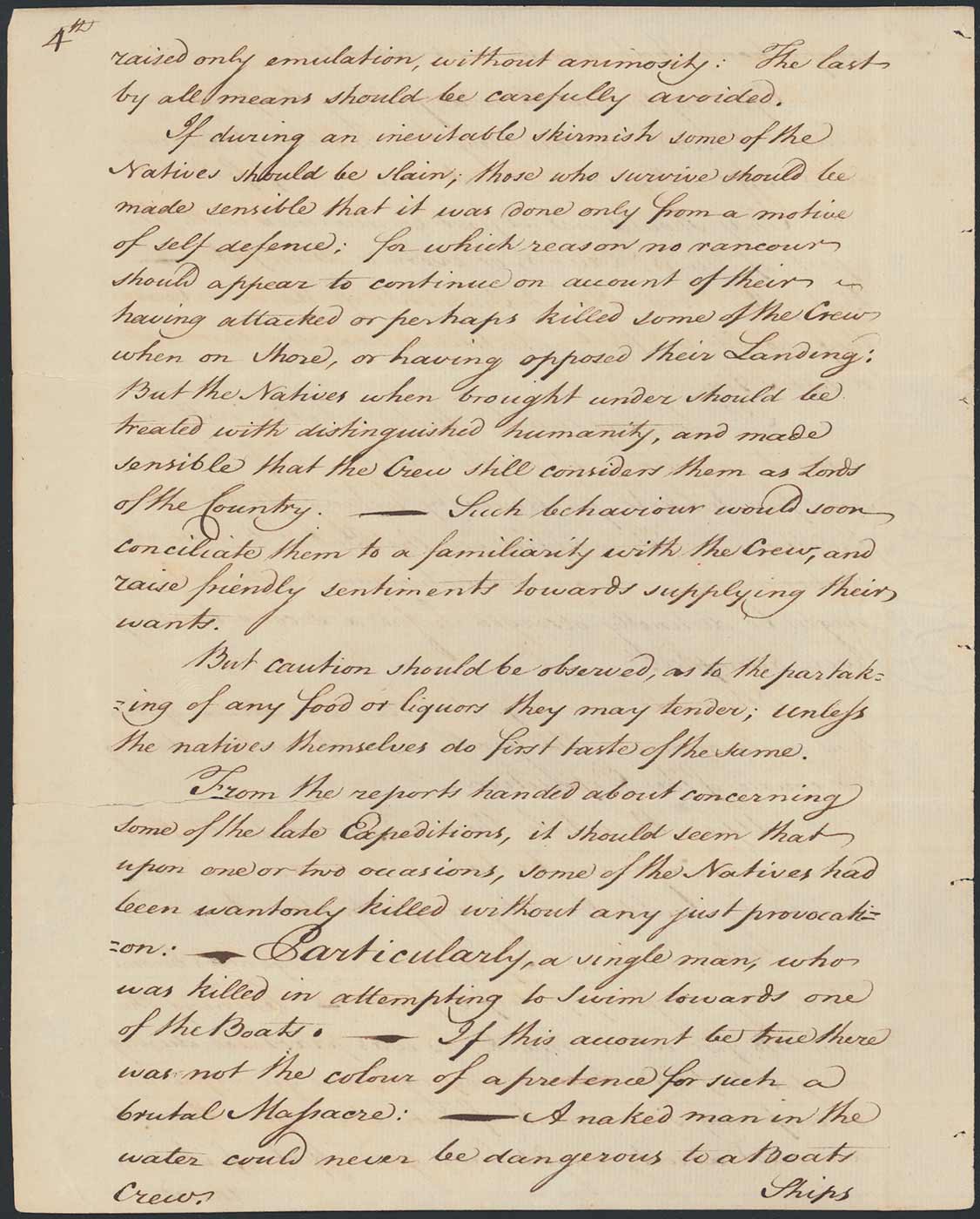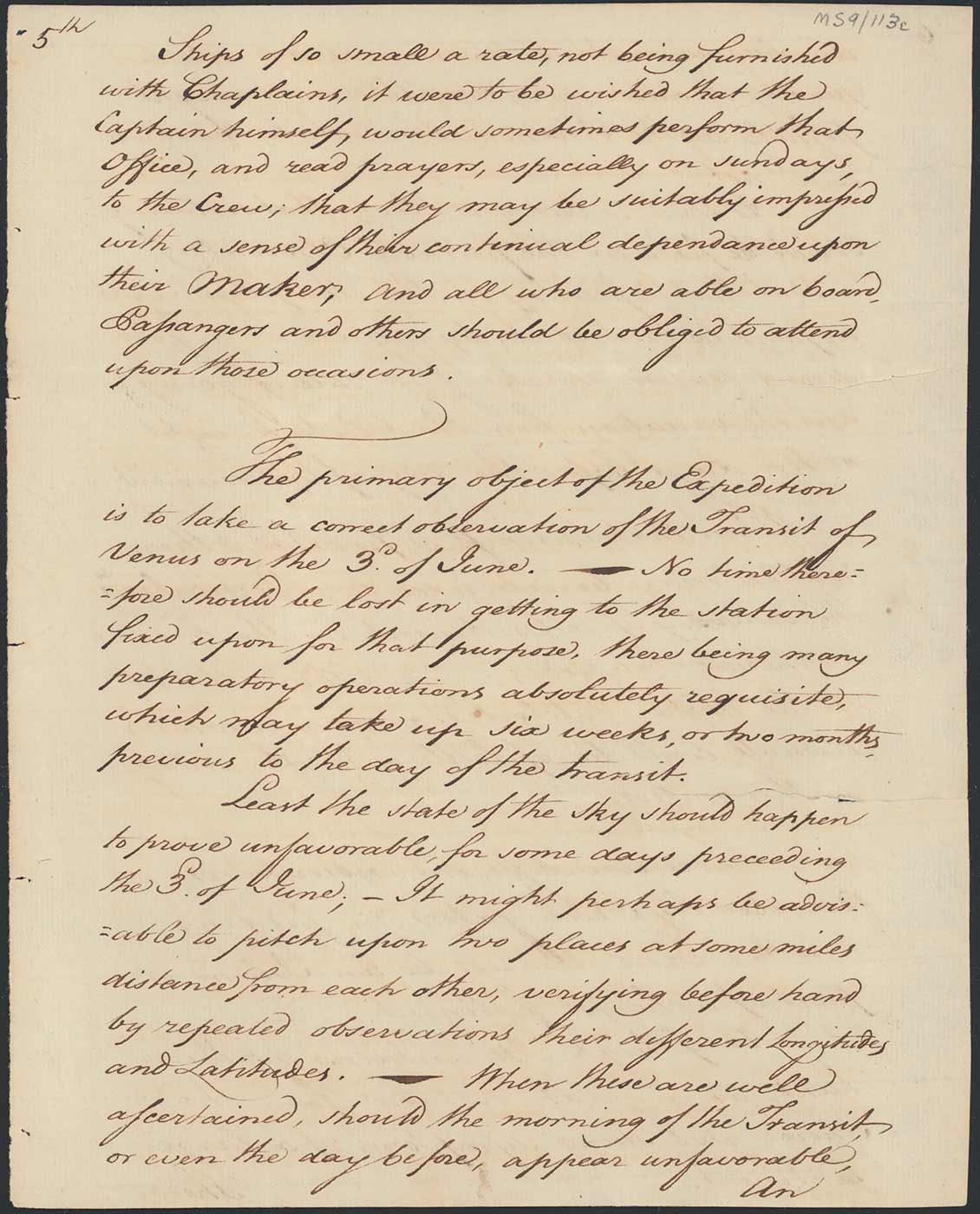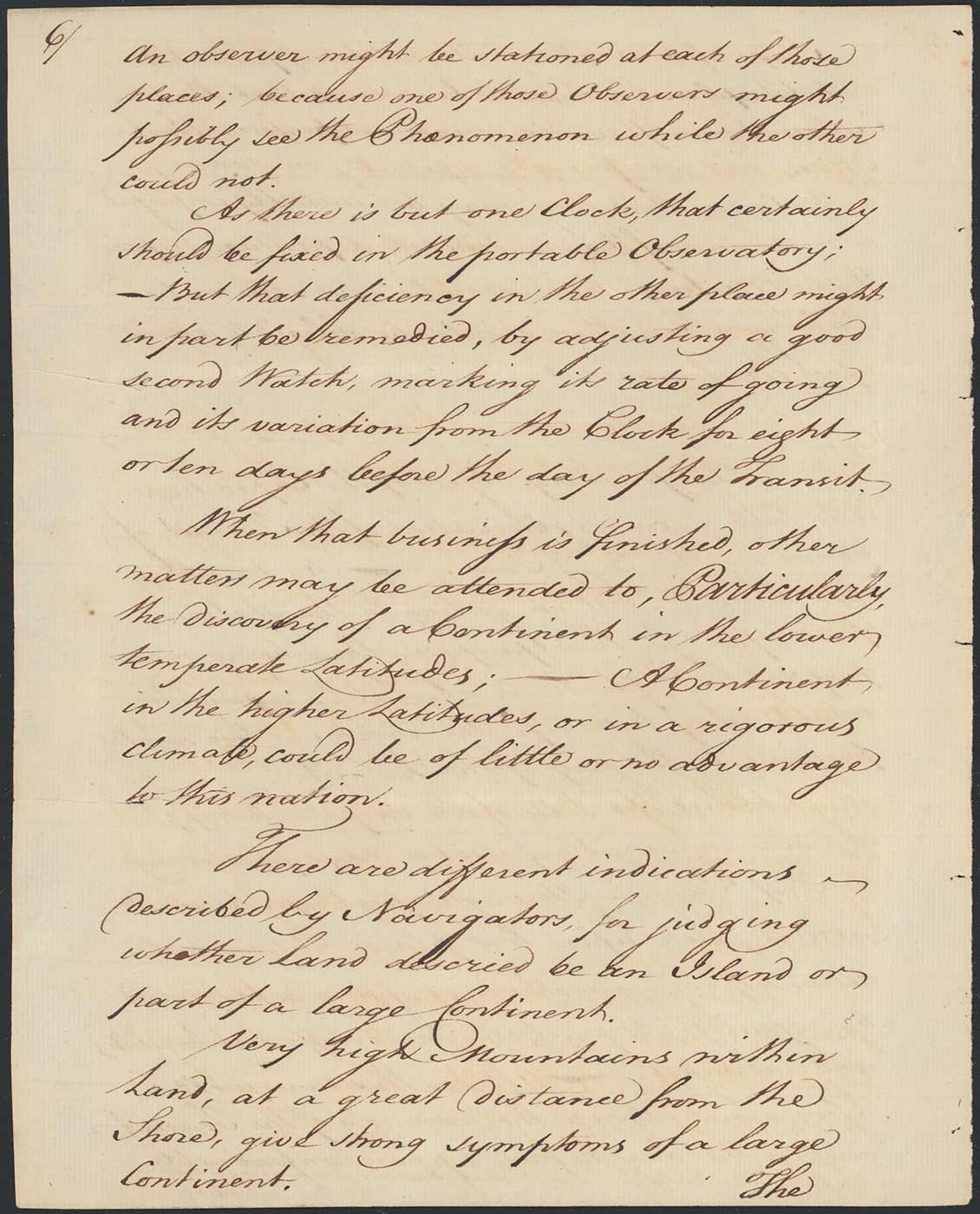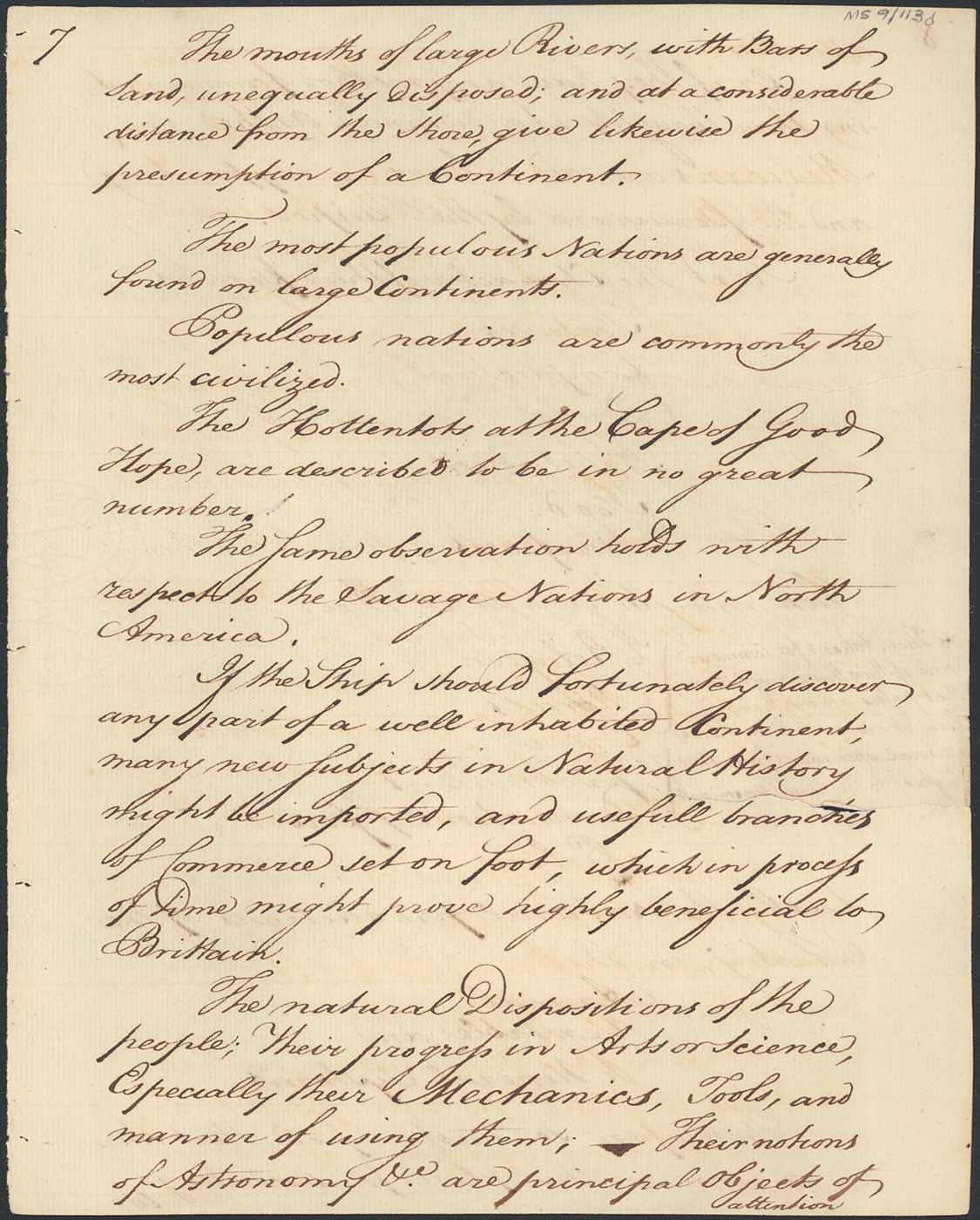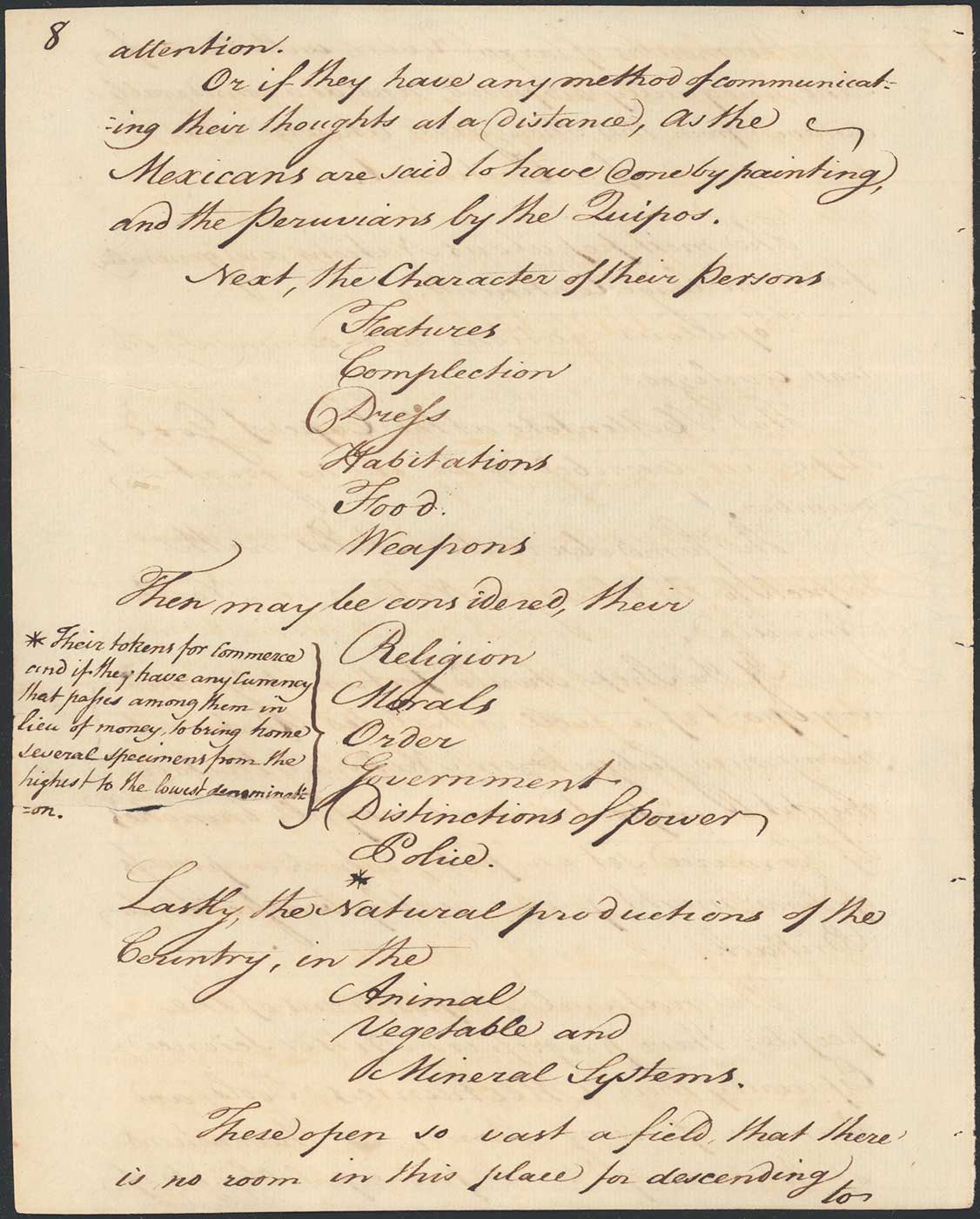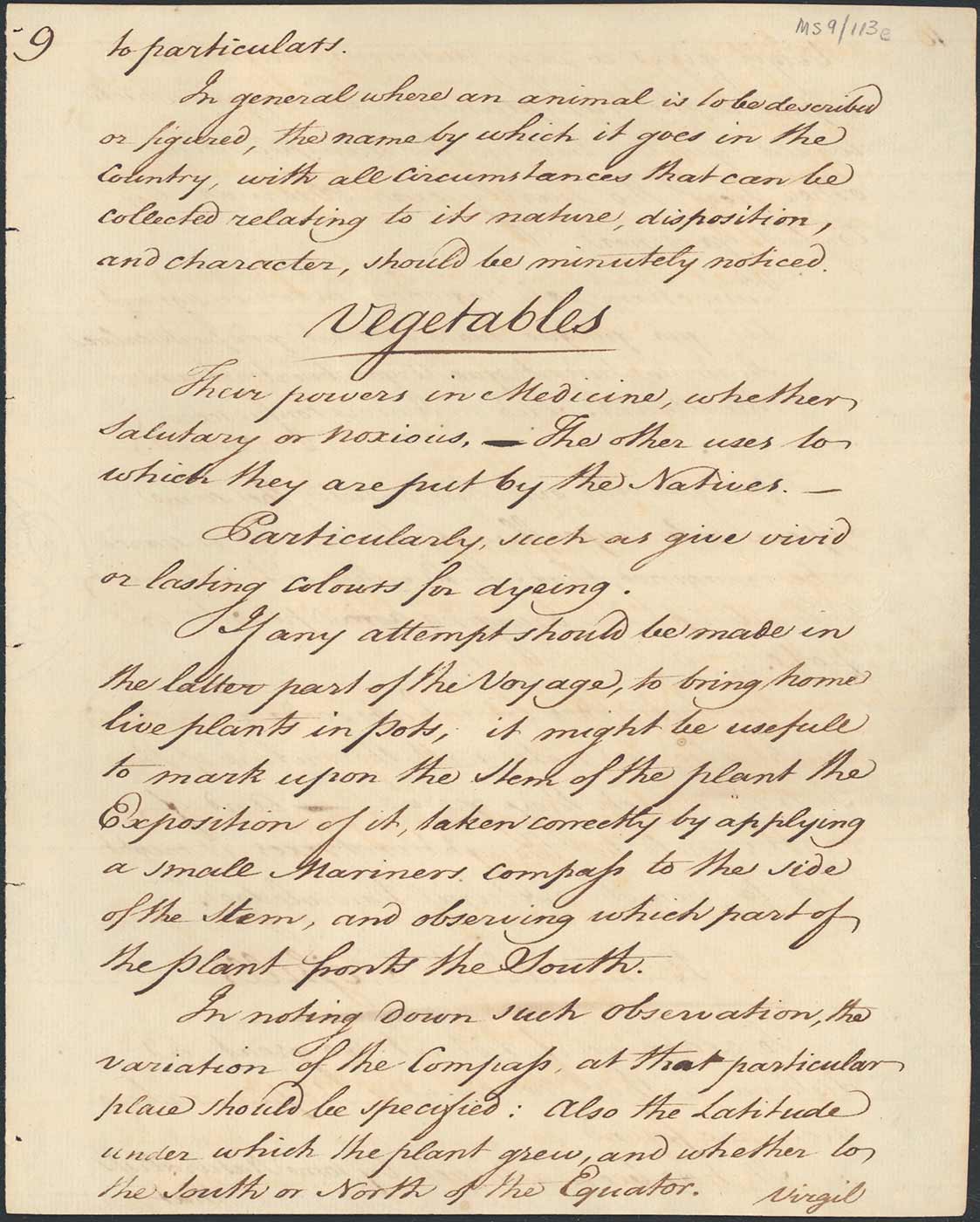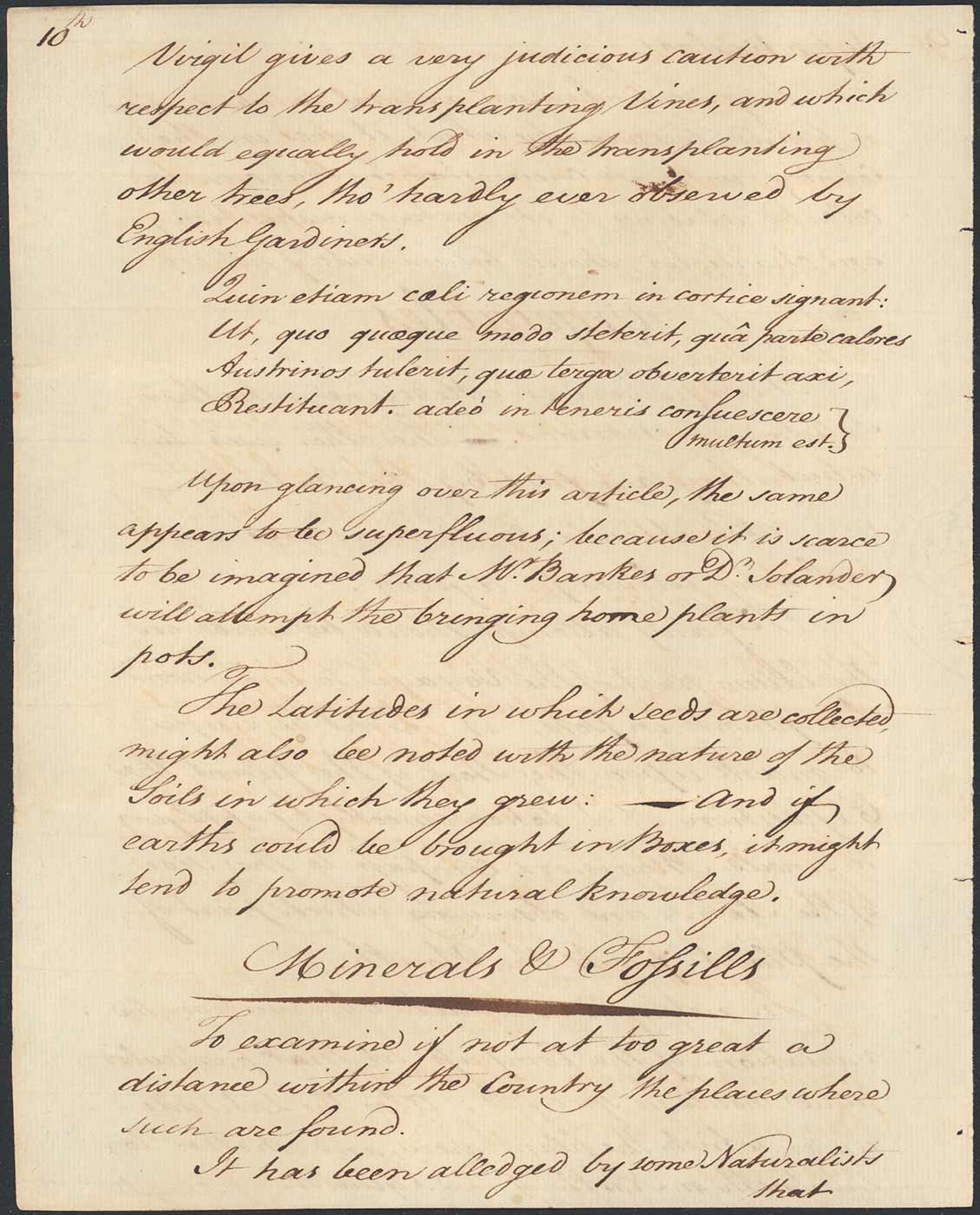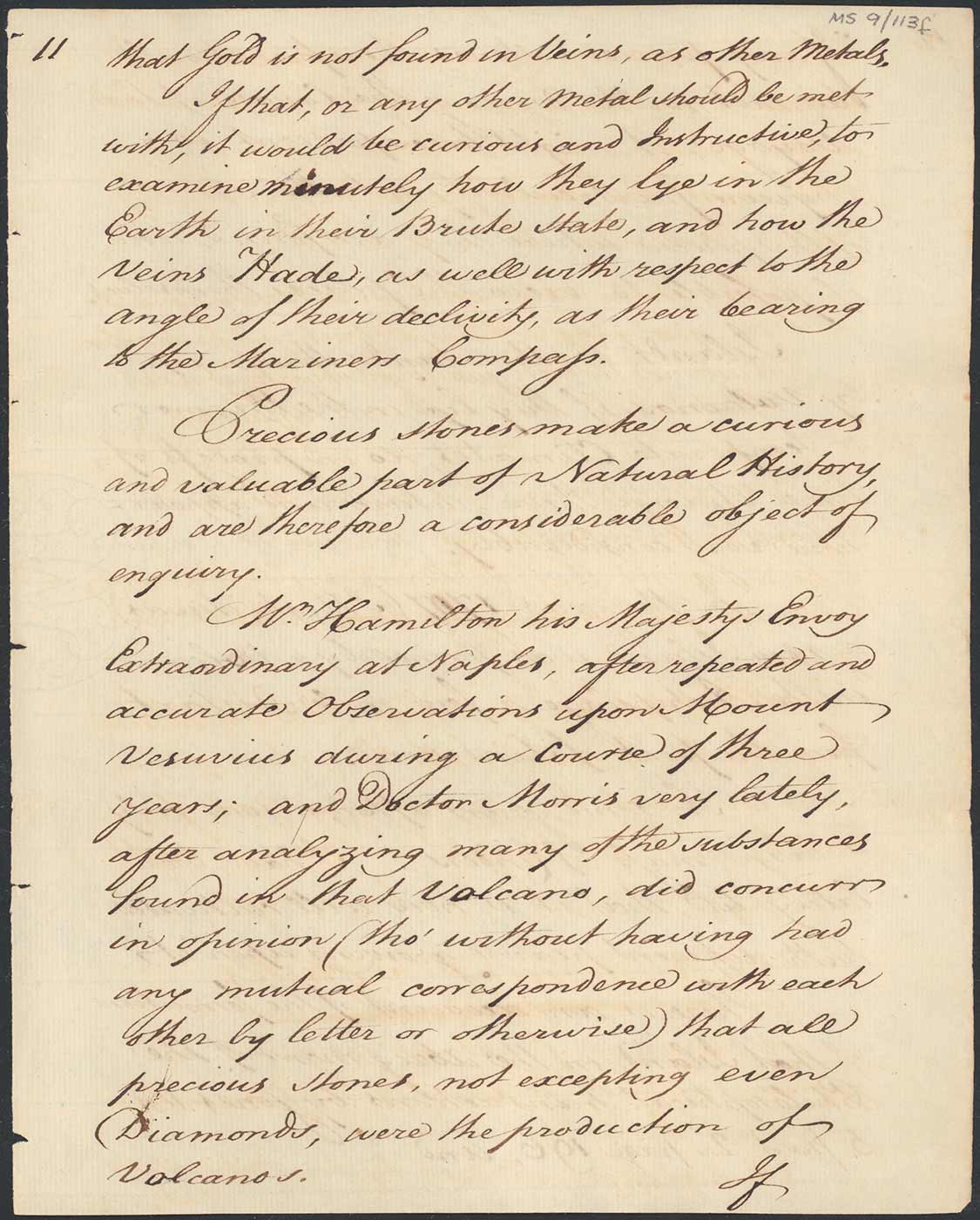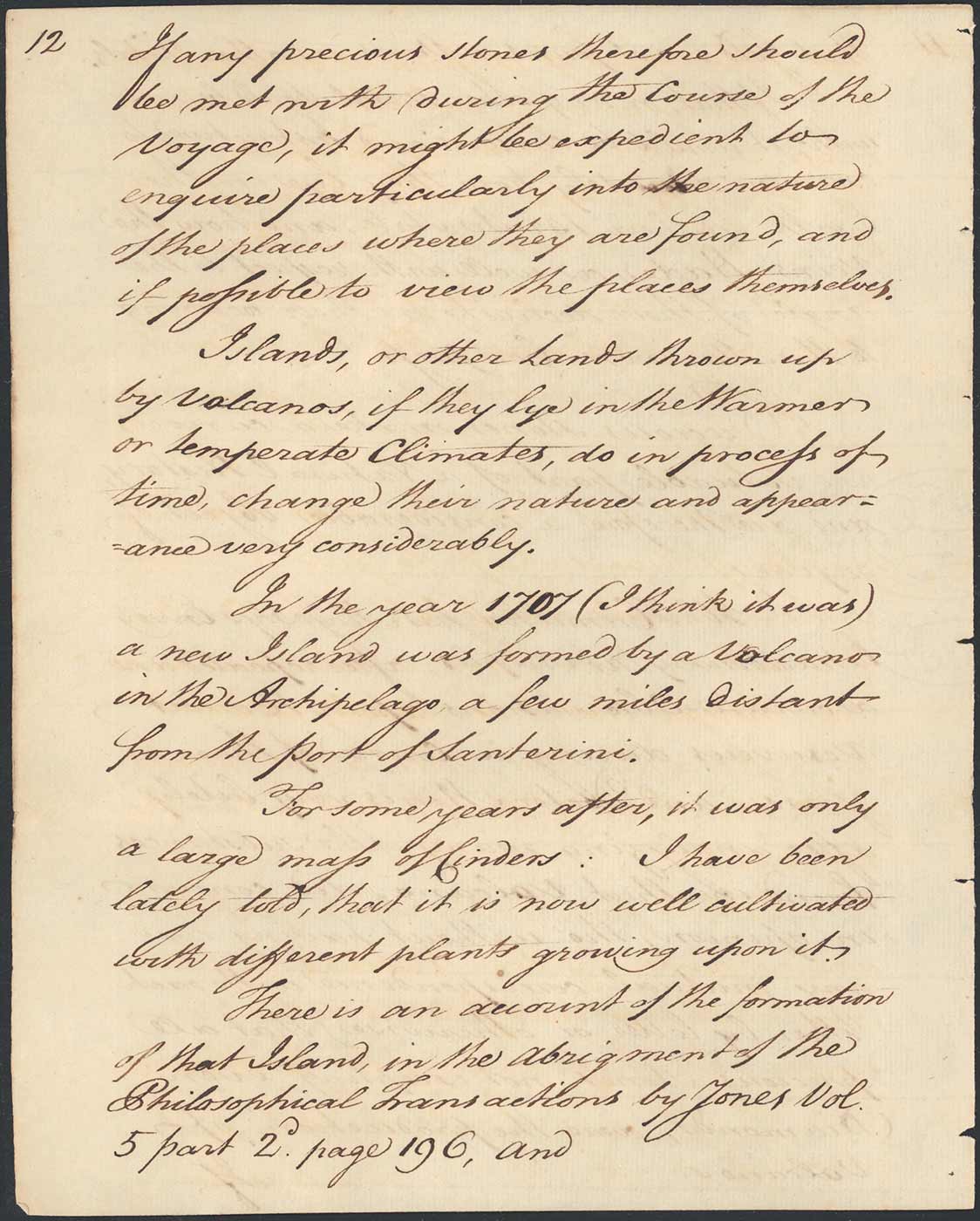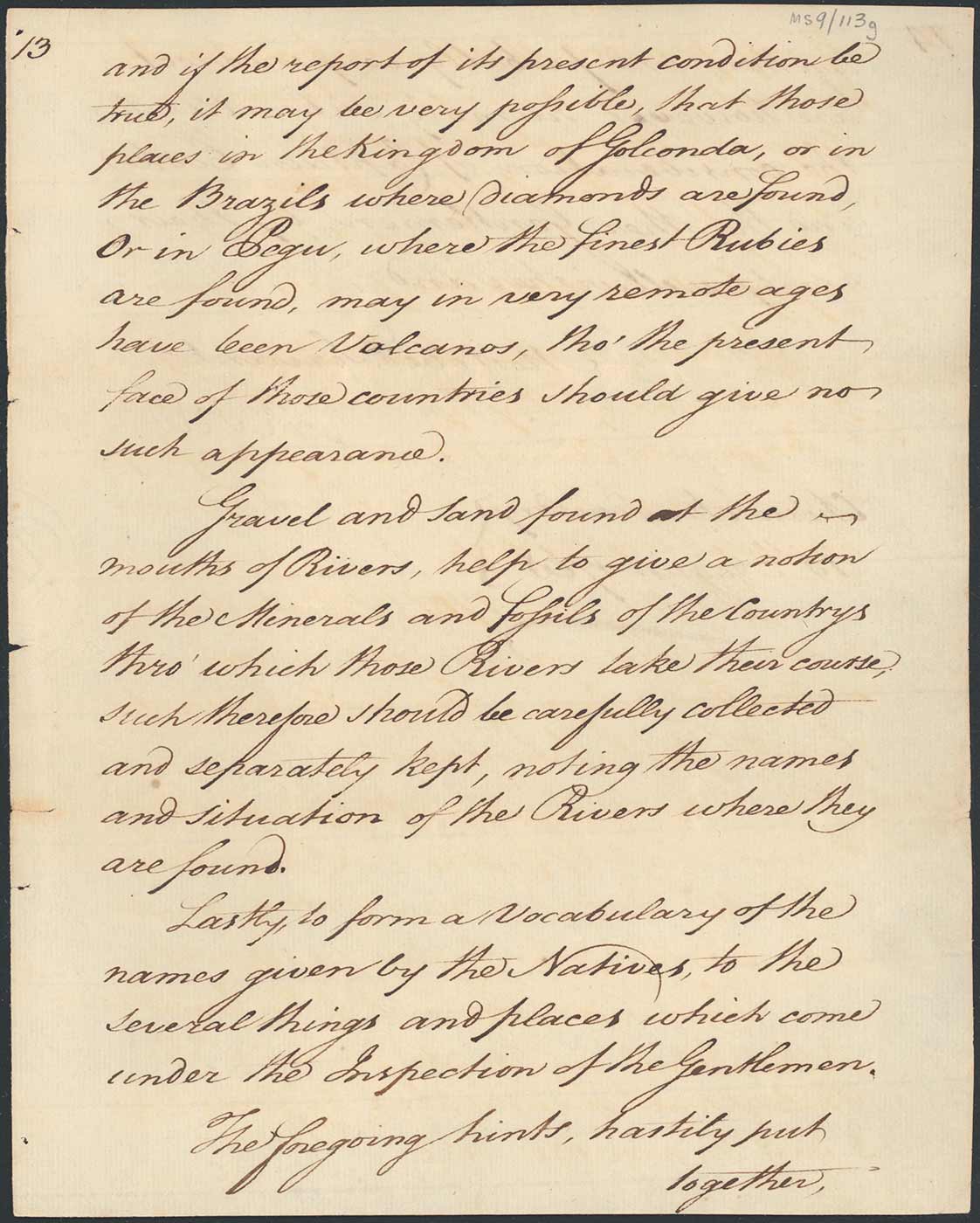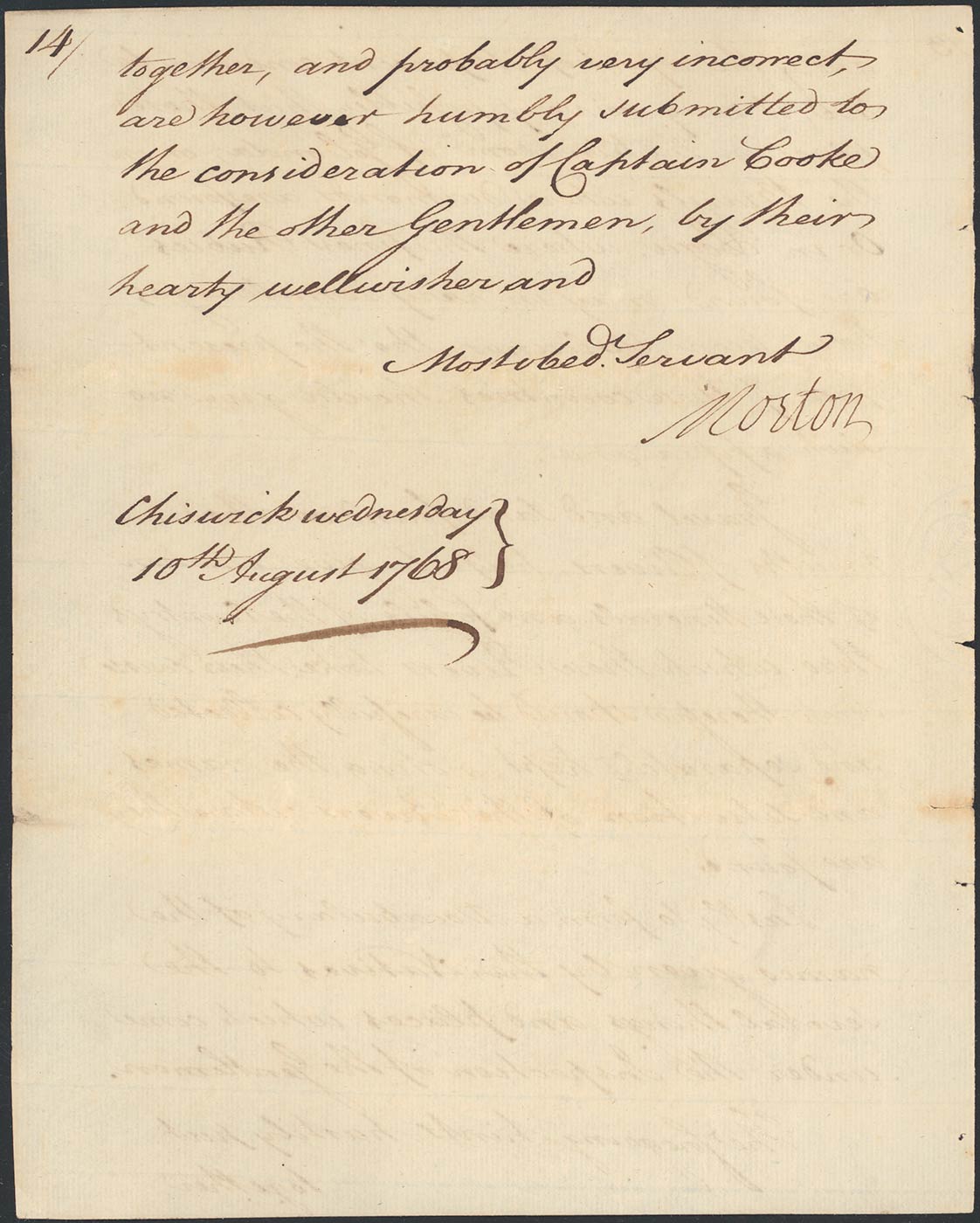The Endeavour expedition was jointly funded by the Royal Society and the Royal Navy. James Douglas, president of the Society, delivered a set of detailed hints to Cook a week before he departed. These contained advice about how the voyagers should interact with people in the new places they visited.
No European Nation has a right to occupy any part of their country, or settle among them without their voluntary consent. Conquest over such people can give no just title; because they could never be the Aggressors.
These words remain potent, given the history that has unfolded since 1770.
Hints offered to the consideration of Captain Cooke, Mr Bankes, Doctor Solander, and the other Gentlemen who go upon the Expedition on Board the Endeavour.
To exercise the utmost patience and forbearance with respect to the Natives of the several Lands where the Ship may touch.
To check the petulance of the Sailors, and restrain the wanton use of Fire Arms.
To have it still in view that sheding the blood of those people is a crime of the highest nature: —
They are human creatures, the work of the same omnipotent Author, equally under his care with the most polished European; perhaps being less offensive, more entitled to his favor.
They are the natural, and in the strictest sense of the word, the legal possessors of the several Regions they inhabit.
No European Nation has a right to occupy any part of their country, or settle among them without their voluntary consent.
Conquest over such people can give no just title; because they could never be the agressors. They
They may naturally and justly attempt to repell intruders, whom they may apprehend are come to disturb them in the quiet possession of their country, whether that apprehension be well or ill founded.
Therefore shou’d they in a hostile manner oppose a landing, and kill some men in the attempt, even this would hardly justify firing among them, ‘till every other gentle method had been tried.
There are many ways to convince them of the superiority of Europeans, without slaying any of those poor people. — For Example. —
By shooting some of the Birds or other Animals that are near them; — Showing them that a Bird upon wing may be brought down by a Shot. — Such an appearance would strike them with amazement and awe. —
Lastly to drive a bullet thro’ one of their hutts, or knock down some conspicuous object with great Shot, if any such are near the Shore.
Amicable signs may be made which they could not possibly mistake. — Such as holding up a jug, turning it bottom upwards, to show them it was empty, then applying it to the lips in the attitude of drinking. — The most stupid from such a token, must immediately comprehend
comprehend that drink was wanted.
Opening the mouth wide, putting the fingers towards it, and then making the motion of chewing, would sufficiently demonstrate a want of food.
They should not at first be alarmed with the report of Guns, Drums, or even a trumpet. — But if there are other Instruments of Music on board they should be first entertained near the Shore with a soft Air.
If a Landing can be effected, whether with or without resistance, it might not be amiss to lay some few trinkets, particularly looking Glasses upon the Shore: Then retire in the Boats to a small distance, from whence the behaviour of the natives might be distinctly observed, before a second landing were attempted.
Other and more important considerations of this kind will occurr to the Gentlemen themselves, during the course of the Expedition.
Upon the whole, there can be no doubt that the most savage and brutal Nations are more easily gained by mild, than by rough treatment.
As resistance may in some emergencies become absolutely necessary for self defence. — Training the men to fire at a mark, as was practised during one part of Lord Ansons voyage, and giving premiums or conferring some mark of distinction upon those who are most adroit, might have good effect, if it is raised
raised only emulation, without animosity: The last by all means should be carefully avoided.
If during an inevitable skirmish some of the Natives should be slain; those who survive should be made sensible that it was done only from a motive of self defence; for which reason no rancour should appear to continue on account of their having attacked or perhaps killed some of the Crew when on Shore, or having opposed their Landing: But the Natives when brought under should be treated with distinguished humanity, and made sensible that the Crew still considers them as Lords of the Country. — Such behaviour would soon conciliate them to a familiarity with the Crew, and raise friendly sentiments towards supplying their wants.
But caution should be observed, as to the partaking of any food or liquors they may tender; unless the natives themselves do first taste of the same.
From the reports handed about concerning some of the late Expeditions, it should seem that upon one or two occasions, some of the Natives had been wantonly killed without any just provocation: — Particularly, a single man, who was killed attempting to Swim towards one of the Boats. — If this account be true there was not the colour of a pretence for such a brutal Massacre: — A naked man in the water could never be dangerous to a Boats Crew. Ships
Ships of so small a rate, not being furnished with Chaplains, it were to be wished that the Captain himself, would sometimes perform that Office, and read prayers, especially on sundays, to the Crew; that they may be suitably impressed with a sense of their continual dependance upon their Maker, and all who are able on board, Passangers and others should be obliged to attend upon those occasions.
The primary object of the Expedition is to take a correct observation of the Transit of Venus on the 3rd of June. — No time therefore should be lost in getting to the station fixed upon for that purpose, there being many preparatory operations absolutely requisite, which may take up six weeks, or two months previous to the day of the transit.
Least the state of the sky should happen to prove unfavorable, for some days preceeding the 3rd of June; — It might perhaps be advisable to pitch upon two places at some miles distance from each other, verifying before hand by repeated observations their different Longitudes and Latitudes. — When these are well ascertained, should the morning of the Transit or even the day before, appear unfavorable, An
An observer might be stationed at each of those places; because one of those Observers might possibly see the Phenomenon while the other could not.
As there is but one Clock, that certainly should be fixed in the portable Observatory; — But that deficiency in the other place might in part be remedied, by adjusting a good second Watch, marking its rate of going and its variation from the Clock for eight or ten days before the day of the Transit.
When that business is finished, other matters may be attended to, Particularly, the discovery of a Continent in the lower temperate Latitudes; — A Continent in the higher Latitudes, or in a rigorous climate, could be of little or no advantage to this nation.
There are different indications — described by Navigators, for judging whether land descried be an Island or part of a large Continent.
Very high Mountains within Land, at a great distance from the Shore, give strong symptoms of a large Continent. The
The mouths of large Rivers, with Bars of Sand, unequally disposed; and at a considerable distance from the Shore, give likewise the presumption of a Continent.
The most populous Nations are generally found on large Continents.
Populous nations are commonly the most civilized.
The Hottentots at the Cape of Good Hope, are described to be in no great number.
The same observation holds with respect to the Savage Nations in North America.
If the Ship should fortunately discover any part of a well inhabited Continent, many new Subjects in Natural History might be imported, and usefull branches of Commerce set on foot, which in process of time might prove highly beneficial to Brittain.
The natural Dispositions of the people; Their progress in Arts or Science, Especially their Mechanics, Tools, and manner of using them; — Their notions of Astronomy etc. are principle objects of attention.
attention.
Or if they have any method of communicating their thoughts at a distance, as the Mexicans are said to have done by painting, and the Peruvians by the Quipos.
Next, the Character of their persons
Features
Complection
Dress
Habitations
Food
Then may be considered, their
Religion
Morals
Order
Government
Distinctions of power
Police
*
* Their tokens for Commerce and if they have any Currency that passes among them in lieu of money, to bring home several specimens from the highest to the lowest denomination.
Lastly, the Natural productions of the Country, in the
Animal
Vegetable and
Mineral Systems.
These open so vast a field that there is no room in this place for descending to
to particulars.
In general where an animal is to be described or figured, the name by which it goes in the Country, with all circumstances that can be collected relating to its nature, disposition, and character, should be minutely noticed.
Vegetables
Their powers in Medicine, whether salutary or noxious, — The other uses to which they are put by the Natives. —
Particularly, such as give vivid or lasting colours for dyeing.
If any attempt should be made in the latter part of the Voyage, to bring home live plants in pots, it might be usefull to mark upon the Stem of the plant the Exposition of it, taken correctly by applying a small Mariners compass to the side of the Stem, and observing which part of the plant fronts the South.
In noting down such observation, the variation of the Compass, at that particular place should be specified: Also the Latitude under which the plant grew, and whether to the South or North of the Equator. Virgil
Virgil gives a very judicious caution with respect to the transplanting Vines, and which would equally hold in the transplanting other trees, tho’ hardly ever observed by English Gardiners.
Quin etiam cali regionem in cortice signant:
Ut, quo quoque modo steterit, quâ partecalores
Austrinos tulerit, quo terga obverterit axi,
Restituant. adeó in teneris confuescere multum est.
Upon glancing over this article, the same appears to be superfluous; because it is scarce to be imagined that Mr Bankes or Dr Solander will attempt the bringing home plants in pots.
The Latitudes in which seeds are collected might also be noted with the nature of the Soils in which they grew: – And if earths could be brought in Boxes, it might tend to promote natural knowledge.
Minerals and Fossills
To examine if not at too great a distance within the Country the places where such are found.
It has been alledged by some Naturalists that
that Gold is not found in Veins, as other Metals.
If that, or any other Metal should be met with, it would be curious and Instructive, to examine minutely how they lye in the Earth in their Brute State, and how the Veins Hade, as well with respect to the angle of their declivity, as their bearing to the Mariners Compass.
Precious stones make a curious and valuable part of Natural History, and are therefore a considerable object of enquiry.
Wm Hamilton his Majestys Envoy Extraordinary at Naples, after repeated and accurate Observations upon Mount Vesuvius during a Course of three years; and Doctor Morris very lately, after analyzing many of the substances found in that Volcano, did concurr in opinion (tho’ without having had any mutual correspondence with each other by letter or otherwise) that all precious stones, not excepting even Diamonds, were the production of Volcanos. If
If any precious stones therefore should be met with during the Course of the Voyage, it might be expedient to enquire particularly into the nature of the places where they are found, and if possible to view the places themselves.
Islands, or other Lands thrown up by Volcanos, if they lye in the Warmer or temperate Climates, do in process of time, change their nature and appearance very considerably.
In the year 1707 (I think it was) a new Island was formed by a Volcano in the Archipelago a few miles distant from the Port of Santerini.
For some years after, it was only a large mass of Cinders: I have been lately told, that it is now well cultivated with different plants growing upon it.
There is an account of the formation of that Island, in the abrigment of the Philosophical Transactions by Jones Vol. 5 part 2nd page 196, and
and if the report of its present condition be true, it may be very possible, that those places in the Kingdom of Golconda, or in the Brazils where diamonds are found, Or in Pegu, where the finest Rubies are found, may in very remote ages have been Volcanos, tho’ the present face of those countries should give no such appearance.
Gravel and sand found at the mouths of Rivers, help to give a notion of the Minerals and Fossils of the Countrys thro’ which those Rivers take their course, such therefore should be carefully collected and separately kept, noting the names and situation of the Rivers where they are found.
Lastly, to form a Vocabulary of the names given by the Natives, to the several things and places which come under the Inspection of the Gentlemen.
The foregoing hints, hastily put together,
together, and probably very incorrect, are however humbly submitted to the consideration of Captain Cooke and the other Gentlemen, by their hearty wellwisher and
Most obed. Servant
Morton
Chiswick wednesday
10th August 1768
